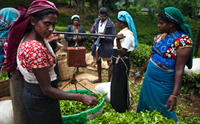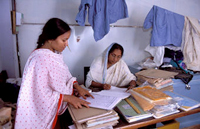Gender and Peacebuilding in 2011
Kathleen Kuehnast, USIP gender expert and director of USIP's new Gender and Peacebuilding Center of Innovation, looks at what the Center will focus on in 2011 and looks back on gender and peacebuilding in 2010.
Updated: January 18, 2011
Kathleen Kuehnast, USIP gender expert and director of USIP's new Gender and Peacebuilding Center of Innovation, looks at what the Center will focus on in 2011 and looks back on gender and peacebuilding in 2010.
- What will the new Gender and Peacebuilding Center focus on in 2011? What are some goals for this year
- What are some highlights of advancements in gender and peacebuilding in 2010?
What will the new Gender and Peacebuilding Center focus on in 2011? What are some goals for this year
USIP will continue to take a leadership role in convening a community of practice that is inclusive of the U.S. and international governments, bi-laterals, the military, and civil society, and that will be based on the foundation of UNSCR 1325—the pillars of Protection and Participation.
The first event will kick off on January 19th, with a half-day symposium on "Gender Mainstreaming in the Military" and "The Role of Civil Society."
Working with leading peace educators, USIP is also developing a gender course for practitioners as a part of its new Academy for International Conflict Management and Peacebuilding.
p>In addition, in the Spring, the USIP Press will launch the book, "Women and War: Power and Protection in the 21st Century."
USIP’s gender-related operational work in 2011 will cover these topics:
- Women and Extremism: Iran, Pakistan and Russia
- Women and Informal Markets in North Korea
- Afghan and Iraqi Women Dialogues in Peacebuilding
- Afghan Women Parliamentarian Leadership Capacity Building
- Women and Traditional Law in Afghanistan
- Sudanese Women and Civil Society Capacity Building
- Colombian Women Peace Mediators
- Women Religious Leaders and Peacemaking
What will the new Gender and Peacebuilding Center focus on in 2011? What are some goals for this year
 In 2010, across the world, governments and civil society marked the tenth anniversary of the United Nations Security CouncilÕs landmark Resolution 1325 on Women, Peace and Security (UNSCR 1325), which links womenÕs experiences of conflict to the international peace and security agenda, and acknowledges the disproportionate impact of violent conflict on women.
In 2010, across the world, governments and civil society marked the tenth anniversary of the United Nations Security CouncilÕs landmark Resolution 1325 on Women, Peace and Security (UNSCR 1325), which links womenÕs experiences of conflict to the international peace and security agenda, and acknowledges the disproportionate impact of violent conflict on women.
One of the major accomplishments in 2010 in the gender and peacebuilding field, included the United StatesÕ commitment of $44 million to develop and implement a National Action Plan to address the full continuum of issues related to Resolution 1325 -- not only increasing international awareness of the costs of failing to protect women in the context of war and armed conflict, but also the costs of failing to include women in efforts to achieve greater global peace and security. Twenty-three other countries have developed 1325 National Action Plans over the past five years. UNSCR 1325 is an important international tool for setting a vision and creating a path for women around the world to play a significant role in peacebuilding.

Throughout the past year, USIP focused the gender and peacebuilding agenda on acknowledging the costs of victimization, but also the pivotal role women should play in the processes of peacebuilding and conflict prevention, including as key actors in peace talks, conflict mediation, and all aspects of post-conflict reconstruction.
Additional highlights of USIP's gender and peacebuilding work in 2019 include:
- Women and War Conference
November 3-5, 2010 | Event
The U.S. Institute of Peace co-hosted a three-day conference focused on the varied experiences of women during wartime and how to make sustained progress toward international peace and security. - Women as a Barometer of Success and Stability? Sharing “Lessons Learned” from Iraq to Afghanistan
September 27, 2010 | Audio
How do we know we are on track when it comes to post-conflict stabilization and reconstruction? How do we know that our military, diplomatic and development efforts are working? These experts believe that one key indicator when gauging success is women’s participation and access to the political, economic and social arenas. - Fall 2010 PeaceWatch
August 2010 | Publications and Tools
Published three times per year, USIP’s PeaceWatch newsletter features stories and photos covering Institute events, accomplishments, news, and announcements of note. This issue focuses on gender as a source of power and peacebuilding. - Security after the Quake? Addressing Violence and Rape in Haiti
August 31, 2010 | Audio
Listen to the audio from a public event where panelists addressed questions on the steps being taken to address crime against women in Haiti, post-earthquake. - Women, Peace, and Security: Fulfilling the Vision of 1325
July 27, 2010 | Video
Watch a video of this working meeting where participants discussed the tenth anniversary of UNSC 1325. Panelists discussed its history, lessons, and experiences of the last ten years.
Gender and Peacebuilding Highlights
Event: Mainstreaming Gender in the Military & the Security Sector: The Role of Civil Society
January 19, 2011
Mainstreaming Gender in the Military & the Security Sector: The Role of Civil Society
Public Event | January 19, 2011
The Other Side of Gender: Including Masculinity Concerns in Conflict and Peacebuilding
Peace Brief | January 2011
Security After the Quake? Addressing Violence and Rape in Haiti
Peace Brief | January 2011
The Role of Women in Global Security
Special Report | December 2010



